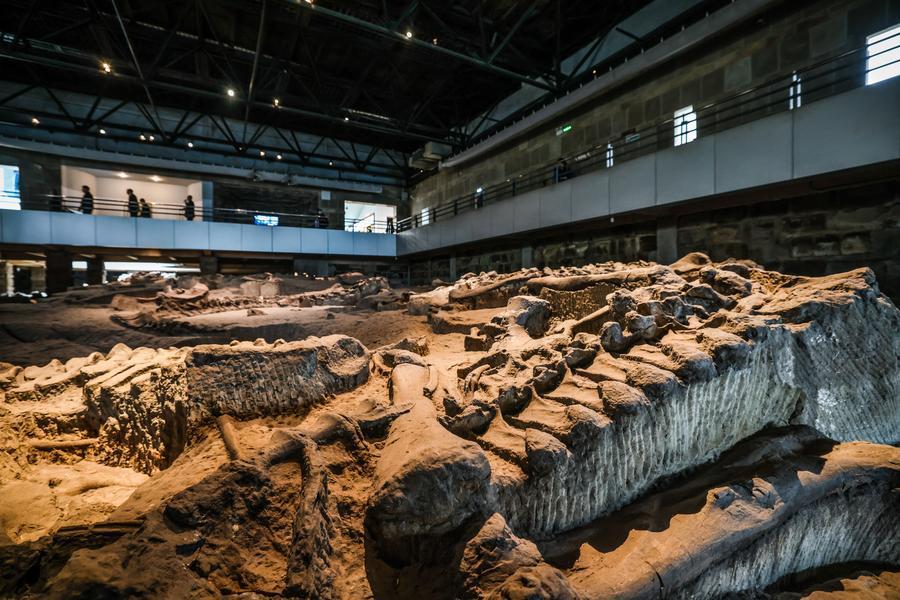
 0 Comment(s)
0 Comment(s) Print
Print E-mail China Daily, September 13, 2024
E-mail China Daily, September 13, 2024

This photo taken on March 19, 2024 shows a view of the Dashanpu Middle Jurassic Dinosaur Fossils Site in Zigong City, southwest China's Sichuan Province. (The Zigong Dinosaur Museum/Handout via Xinhua)
At a time when the world is facing a host of challenges, ranging from climate change to violent conflicts, it is important to remember that humanity has a shared past and should continue to work for a shared future, a United Nations official said.
Shahbaz Khan, director of the UNESCO Regional Office for East Asia, said the inscription of World Heritage sites serves as a reminder of this shared responsibility, because it demonstrates the commitment of member states to jointly preserve such sites.
"Heritage is our legacy from the past — what we live with today and what we pass on to future generations," Khan told China Daily in an exclusive interview.
UNESCO has been seeking to encourage the identification, protection and preservation of cultural and natural heritage sites that are considered to be of outstanding value to humanity.
During the 46th session of the World Heritage Committee in New Delhi, India, in July, the Beijing Central Axis and two natural heritage sites in China were inscribed on the UNESCO World Heritage list, making the country only second to Italy in terms of the number of such sites.
Khan, who has visited quite a few World Heritage sites, including many in Beijing, said he considers these "as open-air museums and libraries that contribute to the transmission of knowledge, skills and values across generations".
In a congratulatory letter sent to the 44th session of the World Heritage Committee in Fuzhou, Fu-jian province, in 2021, President Xi Jinping said that protecting, inheriting and making good use of the world's cultural and natural treasures "is our shared responsibility, and is of vital importance to the continuity of human civilization and the sustainable development of the world".
Khan said he fully agreed with Xi's views. He cited the Beijing Central Axis, which can be traced to the Yuan Dynasty (1271-1368), as a great example of how urban planning transformed to keep up with the times.
"From the Himalayas to the Badain Jaran Desert, China's heritage sites are vital for protecting endangered species and maintaining ecological balance," Khan said. He noted that China has integrated the protection and utilization of World Heritage sites into its national development strategies, recognizing it as a cornerstone of cultural and ecological civilization.
As China is a major global player, its leadership and example in heritage conservation can inspire and influence other countries, particularly in the context of the Belt and Road Initiative, where cultural exchanges and heritage protection are important components, he said.
Khan said the Global Civilization Initiative, put forward by Xi, is a valuable contribution to the global dialogue on cultural diversity and international cooperation.
"It underscores the importance of mutual respect and understanding in an increasingly interconnected world, and supports UNESCO's ongoing efforts to build a more inclusive and peaceful global community," he said.
Calling conflicts "unfortunate", the UN official advocated using dialogue, mutual understanding and respect for all civilizations to resolve such issues.
"We should learn lessons from the mistakes that have been made; learn from the innovations that have been made; and respect the good ideas contributed by everyone," he said.
Khan, who is a big fan of the Chinese classic Journey to the West, said the novel is an example of intercultural fusion of ideas and shows what is best about humanity during difficult times.
As a fictionalized account of the pilgrimage of the Chinese Buddhist monk Xuanzang and his three companions, including Sun Wukong, also known as the Monkey King, the novel enjoys wide acclaim.
"There is a quest inside us for knowledge. We have to overcome many difficulties in our life, and we have to be persistent. We need to continue to learn, and we need to also bring our learning to others in a positive and polite way, as Xuanzang did," Khan said. "I would say there is a Xuanzang in each one of us, irrespective of religion or faith."
He said it is no surprise that the Chinese-made video game Black Myth: Wukong, which is inspired by the novel, has taken the world by storm. "I'm sure there are many more to be made."